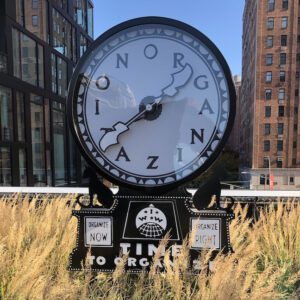
Photo by the author
Erev Rosh Hashanah 5786
As I was walking on the platform of the Malverne train station recently, I noticed a sign for a suicide hotline that said, “Your pain is real. So is hope.”
We’re here this evening on the cusp of a new year, of 5786, hoping to be inscribed in the book of life and death for a good year. For a year of health, happiness and prosperity, for a year of blessing and peace, a year of life.
We have hopes for the future; ours, our children’s and grandchildren’s, and if we’re blessed, great-grandchildren. However, hope can be elusive, and if we’re not careful, can turn to despair. I remember back in high school, my friends and I swearing we’d never have children, because we didn’t want to bring them into such a messed-up world. Now some of our children are having children, and others are deciding the world is too messed up. Ayn hadash tachat ha Shemesh, there’s nothing new under the sun. And while I have no control over their decisions, I hope my children will choose the former and make me a grandmother.
Rabbi Abraham Joshua Heschel, of blessed memory, told a story of a small town where one day, all of the clocks stopped working….
Despite the people’s best efforts, they could not get them to start again. Though many in the village were handy, there wasn’t anyone who understood the inner workings of the apparatus, the springs and dials, the gears and pendulum. Because they were secluded, years passed until someone wandered into the village and was discovered to be a watchmaker. Quickly the town became abuzz, each bringing him their own clocks, hoping this stranger could fix them. One after another lined up, hoping that their most important family heirlooms could be returned to working order.
But soon, each of the villagers met disappointment. After many long winters and wet summers, their clocks were too rusted to salvage.
Yet, among all the heartache and sadness, there was one person who did get good news; the watchmaker could fix her clock. Soon everyone was gathered around this lucky time teller, asking her secret. Why could the watchmaker salvage her clock and no other? “When our clocks stopped, I didn’t know what else to do” the woman said, “so I kept winding my clock each morning as if it worked.” And that simple act of hope and faith had kept it from rusting over.
It’s interesting that the dictionary dot com definition of “hope” is “the feeling that what is wanted can be had, or that events will turn out for the best.” We can hope for the best while preparing for the worst. But what the woman in the clock story did was beyond that, she hoped for the best, tried anyway, and perhaps unconsciously, worked towards a positive result.
A reading in our machzor reminds us, “As we look ahead to a hear of unknown tomorrows, mindful of our frailties and weaknesses, acknowledging our anxieties and our doubts, [we ask God to] help us to go forward unafraid, with hope renewed, confidence restored.”
May hope lead us forward, to confidence, to equanimity and action. At the recent NY Board of Rabbis sermon seminar, Rabbi Steven Exler of the Hebrew Institute of Riverdale shared something interesting. Rather than just representing numbers, he sees the letters of this coming year, taf-shin-pey-vav, as rashei teivot, an acronym. Tav shin stands for T’hi sh’nat, “may the coming year” and then pey and vav stand for other words. So, t’hi sh’nat p’nu v’sa-u, may the coming year help us to go forth, to return to our best selves. T’hi sh’nat… p’ru u r’vu, in the coming year may we be fruitful and multiply, in whatever form that takes at our stages in life.
May the new year be a year of life and health, happiness and prosperity, blessing and peace. Shana tova u m’tooka.









0 Comments